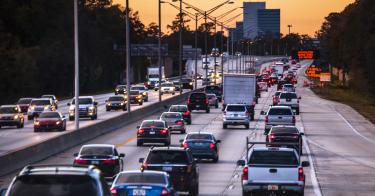What’s good politics isn’t always good policy. Case in point: the America’s Transportation Infrastructure Act of 2019. The proposal has bipartisan support, and has even gotten a favorable tweet from the President Trump.
Yet the bill is severely flawed, layering newly minted handouts on top of long-running policy problems.
The nation’s Highway Trust Fund is in shambles, and the bill does nothing to fix it. Rather than bring spending in line with gas tax revenues, the bill increases spending more than 25%, further swelling our gargantuan national debt.
Why is the trust fund perpetually broke? Because it’s perpetually tapped to fund things it was never supposed to finance. It was created to build the national interstate system, which was completed in 1992. Today, the fund is primarily in the business of cutting checks to states, who spend the money on projects of only state or local significance.
A huge portion of those projects don’t even have anything to do with roads and bridges (the condition of which has been steadily improving for decades). More than a quarter (28%) of federal “highway” funds are diverted to alternative uses such as urban transit, federal lands and ferry boat terminals.
The new legislation only makes this bad situation worse by poking new holes into the trust fund. Most notably, it authorizes billions in spending on “green” initiatives such as subsidizing electric-vehicle charging stations, handouts to states for reducing carbon emissions, and increased funding for walking and bicycling.
It’s not clear that building footpaths and making life easier for Tesla owners should be a national priority, much less that it should be paid for out of the highway fund.
Even when trust funds do go toward highways, taxpayers don’t get as much bang for the buck as they should. “Buy American” mandates cause us to pay more for materials. Rules such as the Davis-Bacon Act and project-labor agreements drive up labor costs.
Repetitive bureaucratic reviews add another layer of waste. Thankfully, the bill would codify a “One Federal Decision” policy, somewhat streamlining the approval process. Yet these projects will still take longer to complete than those where Washington is not in the picture to start with.
The bill’s largest obstacle to passage is finding a way to pay for spending that far exceeds current gas tax revenues. The Senate Environment and Public Works Committee has ceded this decision to the Finance Committee, which has no good options.
A massive gas-tax increase would hammer working families, many of whom already wince every time they have to go to the pump. New taxes, such as on carbon emissions or on vehicle miles traveled, would cement Washington’s oversized infrastructure portfolio and lead to challenging implementation. Adding to the $22 trillion debt would be grossly irresponsible.
Rather than trying to maneuver through a no-win situation, Congress should rethink the federal government’s role when it comes to the nation’s roads and bridges.
Allowing states to take on more responsibility for maintaining, improving, and paying for highways would make construction projects go faster and more cost-effectively. Regulations that exist to provide political benefits rather than promote the public good should be removed. Eliminating unrelated diversions from the Highway Trust Fund would make it financially sustainable and much fairer for drivers.
This approach would even have political benefits. Surveys initiated this year by Heritage Action for America found that, while there is broad public support for infrastructure spending, this support declines significantly when it means that taxes or deficits go up, and it declines much further when wasteful spending and union carve-outs are added to the mix. A policy approach focused on enhancing the value of highway spending would overcome those concerns.
The best way to help America’s families go from point A to point B is to make sure that highways avoid an unnecessary detour through Washington.
This piece originally appeared in The Washington Times



